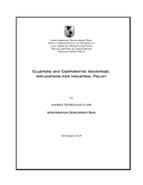Clusters and Comparative Advantage: Implications for Industrial Policy
Date
Dec 2005
Industrial agglomerations or 'clusters' arise in the presence of industry-specific and local externalities, also called Marshallian externalities. The standard argument is that such externalities may justify a policy of infant-industry protection to allow and encourage clusters to emerge. This paper explores that argument and shows that different policy implications emerge under a more realistic modeling of clusters. In particular, rather than distorting prices to promote clusters in 'advanced' sectors that may exhibit strong clustering possibilities, countries should focus instead on promoting clustering in current sectors that have demonstrated the strongest comparative advantage. Import substitution is not a proper way to achieve such a goal.



